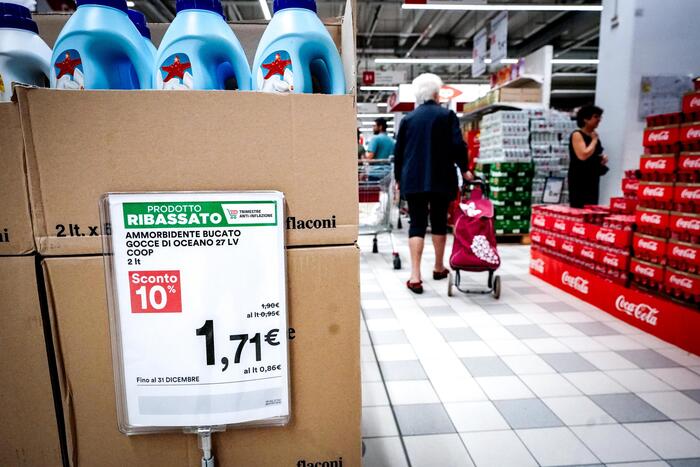Enlarge image
Shopping with children: Price increases are a particular burden for middle-income families and couples
Photo: Patrick Seeger / dpa
Consumer prices have recently risen faster than at any time since 1993. The official inflation rate in December was 5.3 percent. However, this burdens the citizens of Germany to varying degrees, as new calculations by the Institute for Macroeconomics and Business Cycle Research (IMK), which is close to the trade unions, now show. Accordingly, inflation is currently affecting families with children and middle-income couples the most.
The IMK researcher Silke Tober determined the typical consumption patterns for eight different households for the IMK Inflation Monitor, which differ in terms of the number of people and income. For these households, this resulted in their own representative shopping baskets, which differ from the shopping basket used by the Federal Statistical Office for the official inflation rate. In concrete terms, this means that the IMK economist took into account the weighting of food or petrol and diesel in the expenditure of the respective households.
The result: In December, the inflation burden for a family with two adults and two children and an income of 3,600 to 5,000 euros was 5.5 percent and was thus 0.2 percentage points higher than official inflation.
For single people, however, the exposure was consistently lower.
It was lowest at 4.4 percent for singles with very little income below 900 euros.
The chart below shows the different inflation burdens of the different households in December 2021 - as well as in detail the contribution that the different spending areas made to it:
“Roughly speaking, it can be concluded that inflation is currently not disproportionately affecting households with lower incomes,” says Tober. However, according to the IMK researcher, the comparatively lower inflation rate for single people with low incomes is a double-edged sword. Because these singles are severely affected by the rising prices for food and energy - for example for heating and hot water. The fact that their typical inflation is comparatively lower is simply because they simply cannot afford other goods and services that are much more expensive. For example, the sharply increased prices for diesel and petrol do not affect them because they have no money for a car. The same applies to travel.
In general, the IMK researcher sees the currently high inflation as a temporary problem.
"Many current price-driving factors are based on corona-related special effects," says Tober.
“We expect inflation to ease off noticeably this year.”
The fact that this was an exceptional situation is also shown by the price development for the whole of 2021 - which is significantly lower than in December.
For the year as a whole, Tober also determined the different burdens on the various households as a result of inflation:
How high the inflation burden of a specific household is, however, also depends on the individual circumstances.
This is illustrated by the example of three middle-income couple households in the IMK study: If one of these couples heats with oil and drives a car with a combustion engine, the inflation rate in December was 5.9 instead of 5.5 percent.
In contrast, couple 2 had a household inflation rate of 5.2 percent because it heats with gas.
For couple 3, who has gas heating and also uses public transport instead of the car, prices rose by only 3.8 percent in December.
“The current high energy prices are a major burden, especially for people with low incomes,” says Tober.
"This even applies to people on Hartz IV basic security, since the usual heating costs are borne by the state, but not the electricity costs." Politicians should therefore think about help for low-income households.
A subsidy for low earners, especially those with children, is currently a sensible distribution policy measure.
fdi















